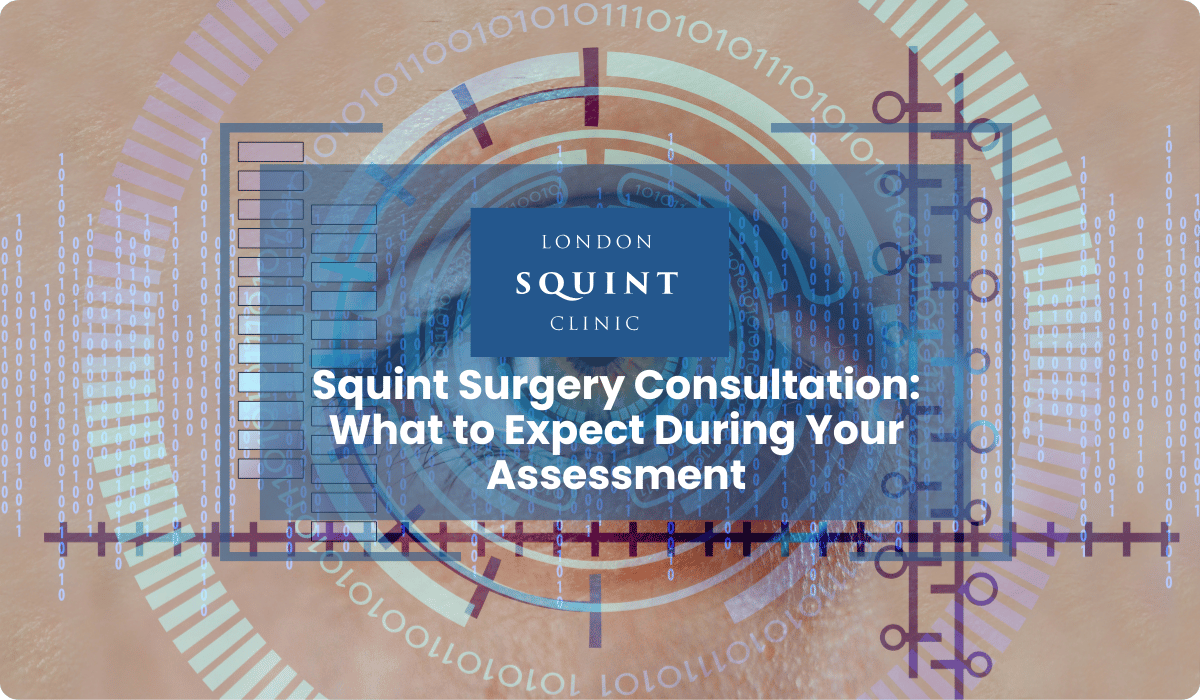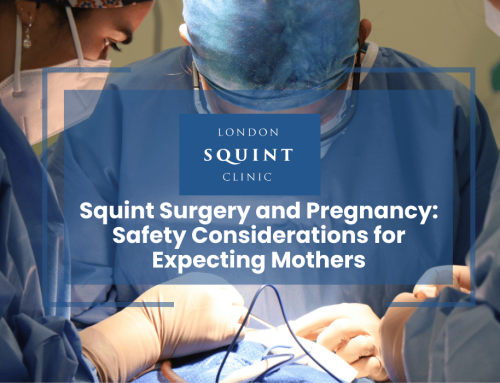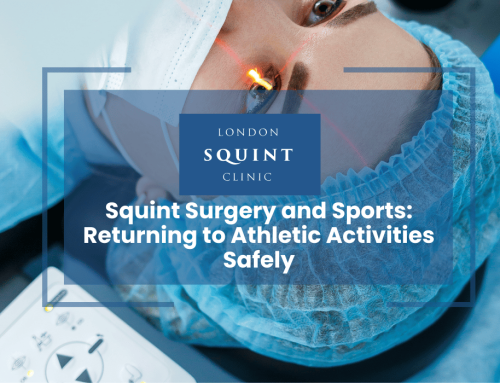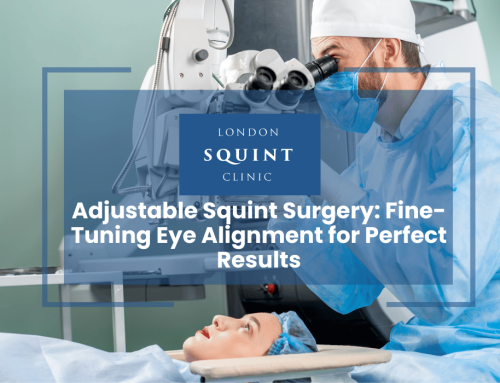Squint Surgery Consultation: What to Expect During Your Assessment
Essential Insights for Your Squint Surgery Journey
- A comprehensive squint consultation typically takes 45-60 minutes and includes visual acuity testing, orthoptic examination, and detailed eye movement assessment.
- Bring your current glasses, previous medical records, and a list of all medications to your appointment for the most accurate assessment.
- Both surgical and non-surgical treatment options will be discussed based on your specific condition, with a focus on balancing functional improvement and cosmetic results.
- Pre-operative diagnostic tests, including prism measurements and the Hess screen test, provide crucial information for surgical planning.
- Following your consultation, expect a clear treatment timeline with surgery typically scheduled within 2-4 weeks if that’s the recommended approach.
- Post-treatment follow-up appointments are essential for monitoring progress, with initial checks 1-2 weeks after surgery and final assessment at 3-6 months.
Table of Contents
- Understanding the Purpose of Your Squint Consultation
- Key Diagnostic Tests During Your Pre-operative Assessment
- What Happens During Your Initial Squint Examination?
- Discussing Treatment Options and Surgical Planning
- How Long Does a Comprehensive Squint Assessment Take?
- Preparing for Your Squint Surgery Consultation
- After the Consultation: Next Steps in Your Treatment Journey
Understanding the Purpose of Your Squint Consultation
A squint consultation at London Squint Clinic serves as the crucial first step in your journey towards correcting eye misalignment. The primary purpose of this assessment is to thoroughly evaluate your specific type of squint (strabismus), understand its underlying causes, and determine the most appropriate treatment approach for your individual case.
During this initial consultation, our specialist squint surgeons will establish a comprehensive picture of your visual system, including how your eyes work together, any vision deficits you may be experiencing, and the precise nature of your eye misalignment. This detailed assessment allows us to develop a personalised treatment plan that addresses both the functional and cosmetic aspects of your condition.
The consultation also provides an opportunity for you to discuss your symptoms, concerns, and treatment goals with our experts. Whether you’re experiencing double vision (diplopia), struggling with depth perception, or concerned about the appearance of your eyes, this appointment allows us to understand your specific needs and expectations. Our specialists will explain how squint correction can potentially improve both your vision and quality of life, setting realistic expectations for treatment outcomes.
Key Diagnostic Tests During Your Pre-operative Assessment
Your pre-operative assessment for squint surgery involves several specialised diagnostic tests designed to evaluate different aspects of your eye function and alignment. These tests provide our surgeons with crucial information needed to plan your treatment effectively.
Visual acuity testing forms the foundation of your assessment, measuring how well each eye can see individually. This is followed by a refraction test to determine if glasses or contact lenses could help improve your vision or influence your squint. For patients with double vision, we conduct detailed measurements using prism bars to quantify the exact degree of misalignment in different gaze positions.
Orthoptic examination is a cornerstone of your pre-operative assessment, evaluating how well your eyes work together. This includes tests for stereopsis (3D vision), fusion ability (how well your brain combines images from both eyes), and measurements of your squint in different directions of gaze. We also assess your ocular motility—how well your eye muscles function when looking in different directions.
Additional tests may include the Hess screen test, which maps the function of your eye muscles, and in some cases, specialised imaging such as CT or MRI scans if we suspect neurological causes for your squint. These comprehensive diagnostics ensure we have a complete understanding of your condition before recommending surgical intervention.
What Happens During Your Initial Squint Examination?
Your initial squint examination at London Squint Clinic follows a structured approach designed to gather comprehensive information about your eye condition. Upon arrival, our team will review your medical history, including any previous eye treatments, general health conditions, and medications that might influence your eye alignment or treatment options.
The clinical examination begins with an assessment of your external eye appearance and facial symmetry. Our specialist will observe your eyes in different positions of gaze, noting any abnormal head postures you may have developed to compensate for your squint. Using specialised equipment, we’ll measure the precise angle of your squint in various directions, which is essential for surgical planning.
A crucial part of the examination involves evaluating your eye movements individually and together. We’ll assess how well your eyes track moving objects and maintain fixation. For adult patients, we pay particular attention to symptoms of double vision, documenting when it occurs and under what circumstances. Our expertise in double vision diagnosis allows us to determine whether your symptoms result from muscle weakness, nerve problems, or other underlying causes.
The examination also includes an assessment of your retina and optic nerve using an ophthalmoscope, as well as measurement of your intraocular pressure. These tests help rule out other eye conditions that might be contributing to your symptoms or that could affect your treatment plan.
Discussing Treatment Options and Surgical Planning
Following your comprehensive assessment, our squint specialists will discuss all available treatment options tailored to your specific condition. This consultation is designed to be collaborative, ensuring you fully understand the benefits and limitations of each approach. For some patients, non-surgical interventions such as specialised glasses, prisms, or orthoptic exercises may be recommended as initial or complementary treatments.
If surgery is deemed the most appropriate option, we’ll explain the specific surgical technique recommended for your case. This might include adjustable suture surgery, which allows fine-tuning of eye alignment after the initial procedure, or conventional squint surgery targeting specific eye muscles. Our surgeons will clarify which muscles require adjustment, whether one or both eyes will need surgery, and the expected degree of correction.
During this discussion, we’ll address important considerations such as the likelihood of achieving single vision (if you have double vision), the expected cosmetic improvement, and whether additional procedures might be needed in the future. We’ll also explain the balance between functional improvement and cosmetic results, as these goals sometimes require different surgical approaches.
This consultation provides an opportunity to discuss anaesthesia options, typically general anaesthesia for most squint procedures, though local anaesthesia may be suitable in certain cases. We’ll also outline the expected recovery timeline, potential side effects, and any activity restrictions following surgery, ensuring you have all the information needed to make an informed decision about proceeding with treatment.
How Long Does a Comprehensive Squint Assessment Take?
A comprehensive squint assessment at London Squint Clinic typically takes between 45 minutes to one hour for most patients. This duration allows our specialists to conduct all necessary tests without rushing, ensuring we gather complete information about your condition. For patients with complex squints or additional eye conditions, the assessment may extend to 90 minutes to accommodate additional testing.
The initial consultation includes several components, each requiring specific time allocations. Your medical history review and symptom discussion usually takes 10-15 minutes, as we gather detailed information about your visual experiences and any previous treatments. The orthoptic assessment, which evaluates how your eyes work together, typically requires 15-20 minutes to complete various measurements and functional tests.
The ophthalmological examination by our squint surgeon generally takes 15-20 minutes, during which your eye health and specific muscle function will be assessed. Following these evaluations, we dedicate 10-15 minutes to discussing our findings, explaining treatment recommendations, and answering any questions you may have about your condition or proposed interventions.
We structure our appointments to ensure adequate time for thorough assessment without overwhelming patients with excessive testing in a single session. For particularly complex cases, we occasionally schedule a follow-up appointment to complete additional specialised tests or to discuss treatment options after reviewing all diagnostic information.
Preparing for Your Squint Surgery Consultation
Proper preparation for your squint surgery consultation helps ensure you receive the most comprehensive assessment and appropriate treatment recommendations. Before your appointment, compile a detailed list of your symptoms, noting when they began, any patterns you’ve observed, and factors that seem to worsen or improve your condition. For patients with double vision, documenting specific situations when it occurs (such as reading, driving, or looking in particular directions) provides valuable diagnostic information.
Bring all current glasses or contact lenses to your appointment, even if you don’t wear them regularly. If you’ve had previous eye treatments or surgeries, collect any available medical records, including operation notes and the names of procedures performed. This historical information helps our specialists understand the evolution of your condition and any anatomical changes from previous interventions.
Make a list of all medications you’re currently taking, including eye drops, as some medications can affect eye muscle function or healing. If you have relevant imaging studies such as CT scans or MRIs of your head or orbits, bring these reports or arrange for them to be sent to our clinic before your appointment.
Consider your questions and concerns in advance, writing them down to ensure nothing is forgotten during the consultation. Think about your treatment goals—whether functional improvement, cosmetic enhancement, or both—as this helps us align our recommendations with your expectations. If possible, arrange for someone to accompany you to the appointment, as they can help remember information discussed and provide support if your eyes need to be dilated during the examination.
After the Consultation: Next Steps in Your Treatment Journey
Following your comprehensive squint assessment at London Squint Clinic, you’ll receive a detailed treatment plan outlining our recommendations based on your specific condition. For patients proceeding with surgery, our team will guide you through the pre-operative preparation process, typically scheduling your procedure within 2-4 weeks of your initial consultation, depending on the urgency of your condition and your personal preferences.
Before surgery, you may require additional pre-operative tests, particularly if you have other health conditions that could affect anaesthesia or recovery. Our surgical coordinator will provide comprehensive written information about your specific procedure, including pre-operative instructions, what to expect on the day of surgery, and detailed aftercare guidelines.
For patients pursuing non-surgical treatments initially, such as prism glasses or orthoptic exercises, we’ll arrange appropriate follow-up appointments to monitor your progress. These typically occur 4-6 weeks after beginning treatment to assess effectiveness and make any necessary adjustments to your management plan.
All patients receive clear information about what to expect during recovery, including potential side effects, activity restrictions, and medication schedules. We maintain close contact during your recovery period, with a post-operative check typically scheduled 1-2 weeks after surgery, followed by additional reviews at appropriate intervals based on your specific procedure and healing progress.
Throughout your treatment journey, our team remains available to address any questions or concerns that arise. We provide emergency contact information for urgent post-operative issues and ensure continuity of care from your initial consultation through to your final follow-up appointment, typically scheduled 3-6 months after surgery to confirm stable, long-term results.
Frequently Asked Questions
What happens during a squint consultation?
During a squint consultation at London Squint Clinic, you’ll undergo a comprehensive assessment that includes reviewing your medical history, measuring visual acuity, testing eye movements, evaluating depth perception, and precisely measuring your squint angle. The specialist will examine how your eyes work together, assess for double vision, and check your retina and optic nerve. Following these tests, your surgeon will discuss treatment options, which may include surgery, prism glasses, or orthoptic exercises, based on your specific condition.
How long does a squint assessment appointment take?
A comprehensive squint assessment typically takes 45-60 minutes for most patients. This includes 10-15 minutes for medical history review, 15-20 minutes for orthoptic assessment, 15-20 minutes for the ophthalmological examination, and 10-15 minutes to discuss findings and treatment recommendations. Complex cases may require up to 90 minutes to complete all necessary testing and evaluation.
Do I need to bring anything to my squint surgery consultation?
Yes, you should bring your current glasses or contact lenses, a list of all medications you’re taking, any previous eye treatment records or operation notes, relevant imaging studies (CT/MRI scans), and a written list of your symptoms and questions. If possible, bring someone with you who can help remember information discussed during the appointment and provide support if your eyes need to be dilated.
Will I need surgery for my squint, or are there non-surgical options?
Not all squints require surgery. During your consultation, our specialists will determine whether non-surgical options might be effective for your specific condition. These can include specialized glasses, prism lenses to correct double vision, or orthoptic exercises to strengthen eye muscles. Surgery is typically recommended when non-surgical approaches are unlikely to provide sufficient correction or for larger-angle squints that affect both function and appearance.
How soon after consultation can squint surgery be scheduled?
Squint surgery is typically scheduled within 2-4 weeks after your initial consultation, depending on the urgency of your condition and your personal preferences. Before surgery, you may need additional pre-operative tests, especially if you have other health conditions. Our surgical coordinator will work with you to find a suitable date and provide comprehensive information about preparation and aftercare.
What diagnostic tests are performed during a squint assessment?
A comprehensive squint assessment includes visual acuity testing, refraction testing, prism measurements for double vision, orthoptic examination (testing 3D vision and fusion ability), ocular motility assessment, Hess screen testing to map eye muscle function, and sometimes specialized imaging such as CT or MRI scans if neurological causes are suspected. These tests collectively provide a complete picture of your eye alignment and function to guide treatment planning.
How will I know if my squint treatment has been successful?
Success criteria for squint treatment vary depending on your specific goals and condition. For patients with double vision, success is measured by the resolution of diplopia and improved functional vision. For cosmetic concerns, success involves improved eye alignment and facial symmetry. Following treatment, we conduct follow-up assessments at regular intervals (typically 1-2 weeks, 6 weeks, and 3-6 months post-surgery) to measure alignment, test vision function, and evaluate your satisfaction with both cosmetic and functional outcomes.
Find out if you are suitable for Double Vision Treatment
Not everyone is eligible for double vision surgery.
Find out if you could benefit from this life-changing surgery by taking the quick self-suitability quiz below:
Our most popular procedures

Hello, I’m Nadeem Ali
I’m one of the few eye surgeons in the world with 100% focus on Squint and Double Vision Surgery.
I have 24 years of eye surgery experience, and worked for 13 years as a Consultant at London’s renowned Moorfields Eye Hospital.
In 2023, I left the NHS to focus fully on treating patients from across the world at the London Squint Clinic. You can read more about me here.
There’s lots of information on the website about: squint surgery, double vision surgery and our pricing.
The most rewarding part of my job is hearing patients tell me how squint or double vision surgery has changed their lives. You can hear these stories here.
Mr Nadeem Ali
MA MB BChir MRCOphth FRCSEd(Ophth)





